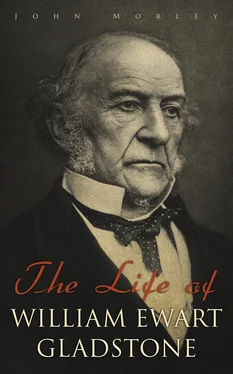In the closing days of the autumn (September 12) Graham interpreted some obscure language of Mr. Gladstone's as meaning that if protection were renounced, as it might be, if Palmerston joined Derby and the government were reconstructed, and if Disraeli ceased to be leader, then his own relations with the government would be changed. Gladstone was so uneasy in his present position, so nice in the equipoise of his opinions that he wished to be, as he said, 'on the liberal side of the conservative party, rather than on the conservative side of the liberal party.' A little earlier than this, Lord Aberdeen and Graham agreed in thinking (August) that 'Disraeli's leadership was the great cause of Gladstone's reluctance to have anything to do with the government; ... that even if this should be removed, it would not be very easy for him to enter into partnership with them.' Mr. Gladstone himself now and always denied that the lead in the Commons or other personal question had anything to do with the balance of his opinions at the present and later moments. Those who know most of public life are best aware how great is the need in the case of public men for charitable construction of their motives and intent. Yet it would surely have been straining charity to the point of dishonour if, within two years of Peel's death, any of those who had been attached to him as master and as friend, either Mr. Gladstone or anybody else, could have looked without reprobation and aversion on the idea of cabinet intimacy with the bitterest and least sincere of all Peel's assailants.
Mr. Gladstone repaired to London some weeks before the new session, and though he was not in a position to open direct relations with the government, he expressed to Lord Hardinge, with a view to its communication to Lord Derby, his strong opinion that the House of Commons would, and should, require from ministers a frank and explicit adoption of free trade through the address, and secondly, the immediate production of their financial measures. Lord Derby told Hardinge at Windsor that he thought that neither expectation was far wrong. When the Peelites met at Lord Aberdeen's to discuss tactics, they were secretly dissatisfied with the paragraphs about free trade.
Mr. Disraeli had laid down at the election the sonorous maxim, that no statesman can disregard with impunity the genius of the epoch in which he lives. And he now after the election averred that the genius of the age was in favour of free exchange. Still it was pleasanter to swallow the dose with as little public observation as possible. 'What would have been said,' cried Lord Derby in fervid remonstrance, 'if shortly after catholic emancipation and the reform bill had been admitted as settlements, their friends had come down and insisted not only that the Houses of parliament should consent to act on the new policy they had adopted, but should expressly recant their opinion in favour of the policy that had formerly prevailed? What would the friends of Sir R. Peel have said in 1835 if, when he assumed the government and when the new parliament assembled, he had been called upon to declare that the reform bill was wise, just, and necessary?' The original free traders were not disposed to connive at Derbyite operations any more than were the whigs. Notice was at once given by Mr. Villiers of a motion virtually assailing the ministers, by asserting the doctrine of free trade in terms they could not adopt. 'Now,' says Mr. Gladstone, 'we came to a case in which the liberals did that which had been done by the government in the case of the Four Seats bill; that is to say, they raised an issue which placed us against them. Lord Palmerston moved the amendment which defeated the attack, but he did this at the express request of S. Herbert and mine, and we carried the amendment to him at his house. He did not recommend any particular plan of action, and he willingly acquiesced in and adopted ours.' He said he would convey it to Disraeli, 'with whom,' he said, 'I have had communications from time to time.'
In the debate (Nov. 26) upon the two rival amendments—that of Mr. Villiers, which the ministers could not accept, and that of Palmerston, which they could—Sidney Herbert paid off some old scores in a speech full of fire and jubilation; Mr. Gladstone, on the other hand, was elaborately pacific. He earnestly deprecated the language of severity and exasperation, or anything that would tend to embitter party warfare. His illustrious leader Peel, he said, did indeed look for his revenge; but for what revenge did he look? Assuredly not for stinging speeches, assuredly not for motions made in favour of his policy, if they carried pain and degradation to the minds of honourable men. Were they not celebrating the obsequies of an obnoxious policy? Let them cherish no desire to trample on those who had fought manfully and been defeated fairly. Rather let them rejoice in the great public good that had been achieved; let them take courage from the attainment of that good, for the performance of their public duty in future. All this was inspired by the strong hope of conservative reunion. 'Nervous excitement kept me very wakeful after speaking,' says Mr. Gladstone, 'the first time for many years.' ( Diary .)
Villiers's motion was rejected by 336 to 256, the Peelites and Graham voting with ministers in the majority. The Peelite amendment in moderated terms, for which Palmerston stood sponsor, was then carried against the radicals by 468 to 53. For the moment the government was saved.
This evening, Mr. Gladstone writes on the next day, Nov. 27, I went to Lady Derby's evening party, where Lord Derby took me a little aside and said he must take the opportunity of thanking me for the tone of my speech last night, which he thought tended to place the discussion on its right footing. It was evident from his manner, and Lady Derby's too, that they were highly pleased with the issue of it. I simply made my acknowledgments in terms of the common kind, upon which he went on to ask me what in my view was to happen next? The great object, he said, was to get rid of all personal questions, and to consider how all those men who were united in their general views of government might combine together to carry on with effect. For himself he felt both uncertain and indifferent; he might be able to carry on the government or he might not; but the question lay beyond that, by what combination or arrangement of a satisfactory nature, in the event of his displacement, the administration of public affairs could be conducted.
To this I replied, that it seemed to me that our situation (meaning that of Herbert, Goulburn, and others, with myself) in relation to his government remained much as it was in March and April last.... We have to expect your budget, and the production of that is the next step. He replied that he much desired to see whether there was a possibility of any rapprochement , and seemed to glance at personal considerations as likely perhaps to stand in the way [Disraeli, presumably]. I said in reply, that no doubt there were many difficulties of a personal nature to be faced in conceiving of any ministerial combination when we looked at the present House of Commons: many men of power and eminence, but great difficulties arising from various causes, present and past relations, incompatibilities, peculiar defects of character, or failure in bringing them into harmony. I said that, as to relations of parties, circumstances were often stronger than the human will; that we must wait for their guiding, and follow it.... He said, rather decidedly, that he assented to the truth of this doctrine. He added, 'I think Sidney said more last night than he intended, did he not?' I answered, 'You mean as to one particular expression or sentence?' He rejoined, 'Yes.' 272I said, 'I have had no conversation with him on it, but I think it very probable that he grew warm and went beyond his intention at that point; at the same time, I think I ought to observe to you that I am confident that expression was occasioned by one particular preceding speech in the debate.' He gave a significant assent, and seemed to express no surprise.
Читать дальше









![William Frith - John Leech, His Life and Work. Vol. 1 [of 2]](/books/747171/william-frith-john-leech-his-life-and-work-vol-thumb.webp)


![William Frith - John Leech, His Life and Work, Vol. 2 [of 2]](/books/748201/william-frith-john-leech-his-life-and-work-vol-thumb.webp)